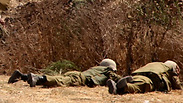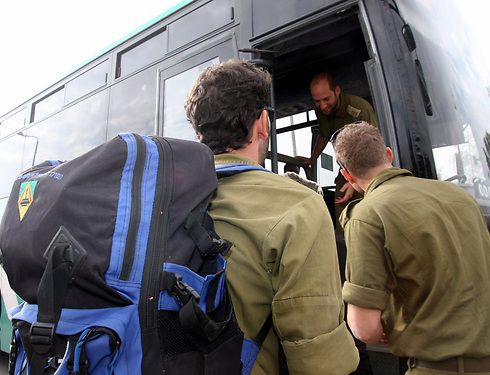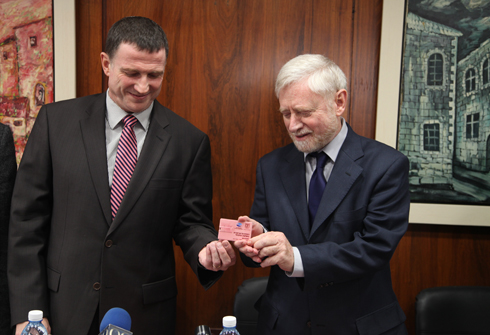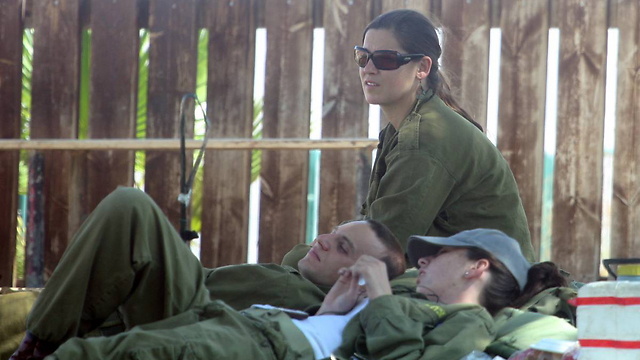
IDF reservists in shabby shape, comptroller says in damning report
After Israel’s 2006 war with Hezbollah, the IDF vowed to bring its reservists up to shape, but new data shows Israel’s reserve forces are still short on training and gear.
The report, penned by the State Comptroller Yossef Shapira and released Monday, found serious deficiencies in the training of reserve units, particularly of ground forces, one of the main lessons learnt from the Second Lebanon War.
The report also claimed that the supply and maintenance units supporting reservists were far from ready, and found major shortcomings in the IDF’s overall level of readiness. Moreover, it found the military did not properly report the true state of its forces to the political echelon, hindering civilian oversight over the army.
The comptroller wrote that in July 2012, IDF Chief of Staff Lt.-Gen. Benny Gantz said that the reserve force holds special importance "both because it is an essential supplement to operational ability and allows routine training of active combat units, and also because it is a significant pillar of the IDF's ability to act decisively during wartime."
In reality, however, things are quite different, and the comptroller found a failure to comply with training protocols and quotas. In 2010, ground forces began implementing a new three-year plan for training in order to expand the scope of training for reserve field units. The report showed that this training model for the years 2010-2012 was not properly implemented, specifically when it came to training at the brigade level.
To make matters worse, some of the battalion training did not even take place, while others saw cutbacks or suffered from a lack of resources. Furthermore, the report found that the training plan for 2013 were cut across the board, and according to IDF response to the report's findings, the training of ground reserve forces was halted altogether in June of 2014.
The comptroller also found that all division commanders who finished their tenure between 2011 and 2013, and 70 percent of commanders of reserves brigades and commanders of artillery formations, who left during those years, filled their roles for a period of less than three years.
The comptroller noted that their short lived tenures resulted in a situation in which many division and brigade commanders did not actually lead their units for an entire training cycle, thus creating a situation in which commanders were unprepared to lead their division or brigade during wartime.
The comptroller also found a failure to maintain continuity in training in accordance with the battalion training model. He explained that manpower in reserve units varied from one brigade to another, and could reach well beyond the standard amount. The report also found that the ground forces earmark a budget to train a maximum of 80 percent of the total manpower.
Concern reservists won't be ready for wartime
Shapira said such a situation did not ensure that a significant portion of reservists in the battalion would maintain proper training. Moreover, it indicated that some battalion soldiers were not training according to the requirements of their units.
Both can damage reservists operational preparedness and create a situation in which reserve soldiers called up in wartime might not actually be those who underwent the required training.
The duration, content, and quality of training were also found lacking. The comptroller said it was impossible under the circumstances to train for the required competence level. The report found many disparities in fitness and readiness in ground reserve units, which could damage their ability to carry out their missions.
Lack of supplies
One of the main lessons from the Second Lebanon War concerned the dire state of military gear for reservists, with some claiming after the fighting had ended that they were forced to go to battle without helmets or proper equipment.
Regarding the preparedness of support supply and maintenance units in the reserve force, the comptroller found serious lapses. Among other things, he found that there was a shortage of enlisted manpower, vehicles no longer fit for duty and tires whose expiration date had passed in each of the regional commands and a lag in periodic maintenance work on armored combat vehicles.
An IDF investigation in February 2013 found that there was also an inability to conduct regular maintenance on equipment during peacetime, which has created a "threat" to the ability to support a transition from peacetime to an emergency.
Communication issues
The comptroller also found a lack of communication with the highest command in the IDF.
The report said there was no coherent and consistent language for presenting data on army preparedness to the different branches of the IDF, and that the assessment was not shown to the Deputy Chief of Staff, the General Staff, and the Chief of Staff.
The comptroller noted that this made it doubtful that IDF's preparedness model could fill its role as "an instrument to present an accurate picture of IDF preparedness for war" and whether the model could be effective in successfully monitoring the situation, and as a tool that affects decision-making and planning in the IDF.
The report further found that IDF orders do not address the level of military preparedness required of ground reserves units in wartime. The ability of both the cabinet and the Knesset to monitor the reserve force's level of preparedness is compromised by the army's disregard for obligations set by the Reserve Service Law.
The comptroller advised the chief of staff to set a "minimum budget" to maintain the reserves force's competence, noting such budget should not depend on the size of the overall defense budget. Shapira added that IDF must urgently attend to the maintenance situation in reserve divisions, to immediately address existing gaps, and ensure that data is suitably presented to senior commanders. He added that the defense minister and chief of staff should work to improve reporting to the cabinet on the level of preparedness of reserve troops.
The Defense Ministry said in response that "in the middle of 2014, the defense minister conducted a forum to update and approve IDF plans, during which he insisted on compliance with the IDF's goals of preparedness to the challenges the army is to face in the coming years. The minister also stressed different requirements for maintaining and attending to the reserve force.
"Ahead of the 2015 work year, there will be an effort to determine a budget designated for training the reservists, relying on advice by Brig. Gen. Roni Noma. It should be noted that the scope of training is derived from the size of the budget, and the lack of an approved state budget, and indeed a required defense budget, will make it difficult for security forces to fully implement this move. On the issue of regular reports on the reserves' readiness, work has begun already in 2014 and will be completed in 2015."
Army officials said that "the findings and recommendations in the State Comptroller's report relate to the three-year training cycle that started in 2010. During the years 2010-2014, the training cycle did not go ahead as planned due to budgetary and operational circumstances (Operation Pillar of Defense, Operation Protective Edge, etc.).
"In addition to that, it needs to be stated that during the second half of 2014, a new plan was made for the last quarter of 2014 which includes most of the training planned and cancelled as part of the cutbacks in 2014. It should also be noted that the continuous decline in the logistics corps' preparedness between the years 2010-2014, with an emphasis on regional logistics units, was a result of cuts in reserve duty days."
Protecting sensitive facilities
The comptroller also examined army ability to protect sensitive facilities from existing threats. The inspection found that most of the decisions made by the Ministerial Committee on Home Front Issues in May 2011 were not implemented."In the current situation, the same problems that have existed since 2004 remain of protecting civilian facilities in Israel from existing threats and threats anticipated in coming years," the Comptroller wrote in his report.
The report also cited a previous report, in which the State Comptroller's Office warned that because there is no comprehensive plan on a national level for the protection of sensitive facilities, there was also no evaluation made of the existing threats or an assessment of possible scenarios and how to protect the facilities from said threats. The current report found that despite the existing threat on these facilities, the failure was not corrected.
In March 2012, the prime minister ordered a list to be made of sensitive facilities, but in reality only a handful of the facilities were installed with protection.
The comptroller noted that the prime minister ought to advance discussions to formulate a security plan for these sensitive facilities.
The Defense Ministry said in response: "The defense establishment mapped out the variety of vital infrastructure in the State of Israel, in accordance with their influence on national strength. Criterions agreed upon in cooperation with the National Security Council were defined for each type of facility.
"The list of facilities has been completed as part of a government decision, and the work of protecting these facilities has already started, based on operational priority. The defense establishment works to coordinate with different government ministries (specifically with the Energy and Water Ministry) and infrastructure companies to arrange a multi-year plan, including budgeting the plan by all involved."
The IDF Spokesman said in response: "The Home Front Command's assessment on the time it will take to install protection in the said facilities includes the installation work only. This assessment does not include issues under the government's responsibility and under that of private companies, such as how long it would take to secure the budget and resources needed for the protection installation and the time it would take to get the facility operators' consent to do the protection work."













